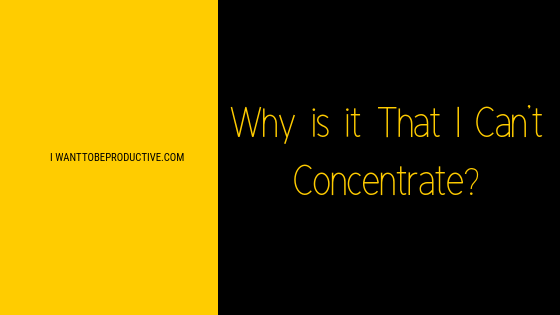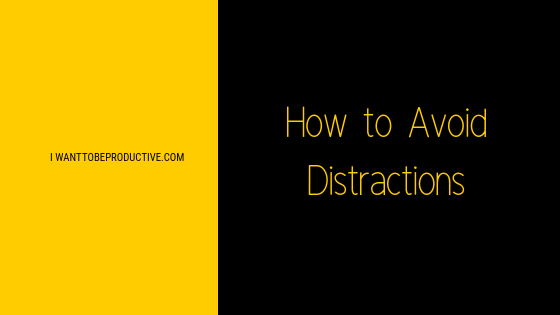Have you ever wondered “why can’t I focus?” during the workday? And how often do you think to yourself “I can’t concentrate“? As you’ll see below, the culprits that hinder your focus and productivity come under many guises and disguises.
After you read this you’ll know how to improve concentration, reduce distractions, optimize your environment, train your brain, become more productive progressively, and work on your discipline to get the most of your concentration.
Like with any other skill, improved mental focus requires a good plan and lots of practice.
So let’s get to it and learn why you can’t concentrate and how to stay focused better!
Why Is It That I Can’t Concentrate?

Distractions are some of the leading causes for lack of focus and decreased productivity. If it’s not your co-workers or friends, it’s a cluttered desk or desktop, the noise around you, or other stimuli that break your concentration.
Gloria Mark, a leading researcher in the emerging field of interruption science, came to some worrisome conclusions. After analyzing data from over 1,000 hours of work from multiple employees she found that:
- An employee spends no more than 11 minutes on a certain task before being interrupted;
- Even more, every 11-minute task is broken down into 3-minute intervals, between which employees have to answer to an e-mail or private message, fill out reports, or do something else;
- Every time an employee is distracted from a task, it takes around 25 minutes to regain focus and resume working.
Most office jobs nowadays are considered interrupt-driven. This is why most companies encourage their employees to use some of the best time management apps and tools during the workday and personal life – to avoid interruptions and distractions. However, it is not that simple as it sounds.
Distractions still temper with our concentration and mental capacities, no matter how hard we try some days.
CONDITIONS IN WHICH WE HAVE TROUBLE CONCENTRATING:
Lack of concentration is due to many other factors. A Cornell study found that if:
- it’s too bright or too dim,
- it’s too cold or too hot,
- it’s too noisy,
- the air is polluted,
- you have no real or perceived control over your task…
…your performance will significantly decrease.
Can’t Concentrate? Here is How to Avoid Distractions

Here’s what you can do to eliminate distracting factors and lay the ground for a better focus:
- Turn off instant notifications. Especially from group chats that are not directly related to your task. Consider temporarily disabling those as well.
- Close down all software programs and browser tabs you don’t need for your task. Even if your computer can handle them, your brain sees them as clutter.
- Tidy up your physical and digital clutter. It might not seem like much, but a clean, neatly organized workspace is essential for your mental and emotional comfort.
- Lay down some ground rules for interactions with those around you. Let coworkers, friends, and family know some activities require your undivided attention.
- Establish a “signal” that tells those who need you when you’re committed to a particular task. Show flexibility and don’t overuse it, though – after all, when everything is a high priority, nothing is!
- Use an air purifier – essential for those living in highly polluted areas;
- Adjust the temperature to around 77 °F. Professor Hedge discovered that most employees’ productivity peaks around 77 °F. In fact, lowering the temperature to 68 degrees increased the incidence of errors by 44%.
- Adjust the brightness and color of the lighting in your workspace. Natural light is the best, but if that’s not an option try to go for light sources with temperatures of 5000K or higher. Use specialized software to adjust the color of your electronic displays to the type of lighting you have available; my personal favorite is f.lux since it gradually adapts color and intensity depending on sunrise, sunset, and the type of lighting you have in your home.
Other Tips to Help When You Can’t Concentrate
- Use time-management apps and tools at work and at home. After a while, you will learn how to make time work in your favor and not against you.
- Check out our guide on how to stay focused at work! Besides preventing distraction tips and tricks, the guide also delivers actionable advice on how to make a realistic schedule of your work day, identify & eliminate mental blocks, and more!
- Practice mindfulness (and even meditation). It sounds almost impossible to meditate at work in a busy office, but it is not impossible. Here are more things to know about mindfulness and meditation. See what you can apply in your everyday work and personal life and choose the techniques that serve you best!
When You Can’t Concentrate, Deep Breathing Inhibits Concentration Problems
A 2017 study on diaphragmatic breathing has shed more light on the benefits of deep breathing on cognition, emotions and stress. Researchers have discovered that breathing deeply makes a significant positive difference in subjects’ sustained attention, affect, and stress levels.
Adults, especially those who are under a lot of pressure, tend to take short, speedy breaths. It’s a sign your body is under a state of stress. Stress, in turn, triggers the “fight, flight, or freeze” instinct. And while taking off might help in some emergency cases, most critical situations demand a clear, relaxed mind to be able to find the best solution.
You can go into more detail on how to stay focused under pressure in the next chapter. However, get into a concentrated state of mind right away by doing the next breathing technique. It’s my personal favorite and it’s called the box breathing technique.
All you have to do is inhale, hold, exhale and hold again through a cycle of 5 counts each as seen in the image below. This exercise will relax your body and your mind. You’ll see your concentration improve after just a few minutes of practicing this deep breathing technique.

I Can’t Concentrate Because I Have No Training
Your brain and cognitive abilities, including your attention span and focused attention can suffer from atrophy, just like regular muscles.
In fact, I’m sure your mind started to wander while reading this very article on how to stay focused.
The truth is, no matter what aspect of your life you want to improve, you will need to get out of your comfort zone to make a significant change. We need to be persistent and train our willpower. It’s the only way to grow and adopt new behaviors.
How to Train Your Brain to Stay Focused:
- Get enough sleep. You won’t be able to concentrate on a tired brain.
- DON’T try to Multitask. Multitasking reduces your cognitive capacities and intelligence. Only 2% of people can handle multi-tasking, but even for them the energy cost is, in the long run, unsustainable.
- Meditate and do mindfulness exercises. Doing meditation will set the background for more exhaustive cognitive tasks later on. See chapter #3 for more details on how mindfulness and meditation help you stay focused.
- Practice your memory. Make a goal out of memorizing something small each day, even a new phone number or a haiku. It will work your brain muscles, thus your concentration as well.
- Read more and read slowly. Reading more and reading slowly will help avoid scrolling and skimming and engage you more with the content at hand. You’ll need a steady focus for prolonged reading sessions. It’s an excellent exercise for your mental focus.
- Do concentration exercises. Find a book or use an app for this one. Or if you want to it right away, see the video below!
I Can’t Concentrate Because I’m Not Motivated
If you’ve gone through the aforementioned tips but your focus doesn’t seem to have improved all that much, it’s time to take a step back.
Is it possible you’ve burned yourself out? Are you sure you understand the importance of the tasks you need to complete in the long run?
Do you not feel challenged (anymore)?
What’s stopping you from just getting stuff done?
Take your time and think about it, you’ll definitely find out something new about yourself.
What would make you purposefully work on yourself and your goals? Make a list of the things that keep you grounded and level-headed. Chances are, you have some unfulfilled needs that are blocking your cognitive abilities and prohibiting you from unlocking your full potential.
Here’s how to assess your motivation and clear the path toward improved focus:
- Use this motivation assessment for students.
- MindTools offer a catchy little self-motivation assessment here.
- Or maybe you do indeed need a little pressure to focus better?
I Can’t Concentrate Because I Don’t Delay Gratification
In short, the concept of delayed gratification refers to our ability to tolerate difficult, uncomfortable, or strenuous conditions.
It’s about de-prioritizing pleasure today for the sake of a bigger, more worthwhile reward tomorrow. If you give in to temptation, you’re working hard on damaging your focus and discipline. Here are, in short, the long-term benefits of delayed gratification:
Being able to delay satisfaction isn’t the easiest skill to acquire. It involves feeling dissatisfied, which is why it seems impossible for people who haven’t learned to control their impulses. Choosing to have something now might feel good, but making the effort to have discipline and manage your impulses can result in bigger or better rewards in the future. Over time, delaying gratification will improve your self-control and ultimately help you achieve your long-term goals faster.
Working out even though you don’t feel like it, penny-pinching for a few months to travel overseas for vacation, working in a position you don’t particularly like for the sake of your future career, are all good examples of delayed gratification.
This is the core concept behind successful people.
Of course, Freud’s pleasure principle is essential to our well-being. Thousands of years ago, the pleasure principle worked out fine for the survival of the species as well.
But in an age where survival has become less about physical abilities and more about mental capacities and resilience, the pleasure principle is becoming more and more counter-productive in the long run.
So how do we delay gratification?
- Start with the most challenging tasks. Every decision you make and any drawback you stumble upon tires your brain. Even though you might want to start with small, mindless tasks, it feels more rewarding to check them off your to-do list, but be aware of precisely this: it’s only a feeling.
- Break the habit. Once you discern through, you can break this counter-productive habit.
- Reach your goal in 6 months. Start with where you are and where you want to be and give yourself six months to get there. See the video below:
I Can’t Concentrate Because I’m Thinking of Him/Her
Is your mind awash with butterflies at the thought of a romantic interest? Can you simply not go on about your day without obsessing about them?
You’re not the only one. While research shows that employees who feel love perform better at work, being romantically infatuated with someone far away is bound to attract trouble.
The first thing you need to remember and understand is that your life goes on without them. Whether we’re considering work, health, or family issues, life will always continue regardless of who is in your life.
Do you fear that not thinking about them for even a second will lead you to lose them? Or perhaps you have just met them and you can’t get them out of your head?
If they’re the right person to worry over, then they’ll always be there for you after work. It doesn’t help to distract yourself from what matters with what doesn’t. Besides – whether you believe it or not, there is always someone else out there in the world for you.
In the end, you need to remember that they might disappear out of your life at one point or another. It might hurt you, but it’s not going to kill you.
On the other hand, not having a way to put bread on the table is worse. Your career and success should come first until you are on stable ground. It is only after that you will be able to comfortably make romantic concessions and afford to be swept away by the wind.
When the love obsession hits you again, remember to:
- Distract yourself with work or ambient music.
- Learn to enjoy what you do so you miss them less.
- Enjoy the butterflies and don’t let them wear you down.
It’s normal to fall in love. But remember: the only person you’ll always have to contend with is the “man in the mirror!”
How to Stay Focused When You Can’t Concentrate
Why can’t I focus? I can’t concentrate! These are some of the things we have to deal with every day at work and in life. If you recognize yourself in these words, you know you have to do something about it. We hope this guide helps you start with the right foot on the path of finding focus, concentration, and perseverance. If you know other tips and tricks on how to stay focused and help others, let us know in the comment section below! What worked for you? What would you recommend? Share your thoughts and experiences and lets us all be a bit more productive and happier together!
- Practice often. Maximizing your concentration to stay focused takes time and practice. You will fail often. Don’t beat yourself up. Take it easy. This is essential for your mental health, which ultimately has a saying in all aspects of your life.
- Reward your accomplishments. Small or big, remember to set up a reward system for yourself.
- Positive reinforcement. This is essential, especially when tackling big, previously thought-unachievable goals. At the end of each day, no matter how terrible, think of the things that show your progress.
In the next chapter…
There you have it! If you’ve tried everything and you still can’t concentrate, there might be serious underlying issues; our recommendation is to seek professional help without delay.
I hope the first article in this series has provided useful pointers to implement right away and get rid of those pestilent mental blocks. In our next article, we talk about something a tad more touchy:

I’m passionate about personal development and growth, personality traits, and all things related. When I’m not working on myself, I enjoy hiking in the great outdoors, reading, watching movies, and taking care of my indoor garden. But my strongest passion will always be self-help.
